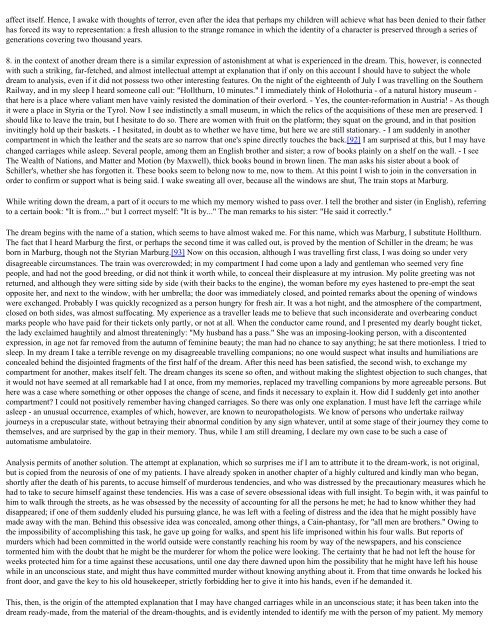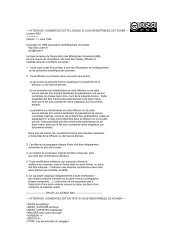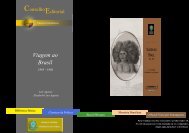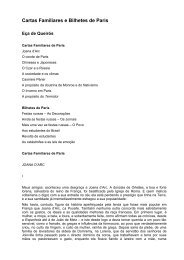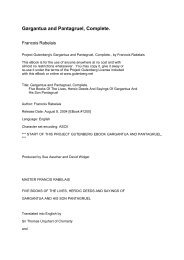The Interpretation of Dreams Sigmund Freud (1900)
The Interpretation of Dreams Sigmund Freud (1900)
The Interpretation of Dreams Sigmund Freud (1900)
You also want an ePaper? Increase the reach of your titles
YUMPU automatically turns print PDFs into web optimized ePapers that Google loves.
affect itself. Hence, I awake with thoughts <strong>of</strong> terror, even after the idea that perhaps my children will achieve what has been denied to their father<br />
has forced its way to representation: a fresh allusion to the strange romance in which the identity <strong>of</strong> a character is preserved through a series <strong>of</strong><br />
generations covering two thousand years.<br />
8. in the context <strong>of</strong> another dream there is a similar expression <strong>of</strong> astonishment at what is experienced in the dream. This, however, is connected<br />
with such a striking, far-fetched, and almost intellectual attempt at explanation that if only on this account I should have to subject the whole<br />
dream to analysis, even if it did not possess two other interesting features. On the night <strong>of</strong> the eighteenth <strong>of</strong> July I was travelling on the Southern<br />
Railway, and in my sleep I heard someone call out: "Hollthurn, 10 minutes." I immediately think <strong>of</strong> Holothuria - <strong>of</strong> a natural history museum -<br />
that here is a place where valiant men have vainly resisted the domination <strong>of</strong> their overlord. - Yes, the counter-reformation in Austria! - As though<br />
it were a place in Styria or the Tyrol. Now I see indistinctly a small museum, in which the relics <strong>of</strong> the acquisitions <strong>of</strong> these men are preserved. I<br />
should like to leave the train, but I hesitate to do so. <strong>The</strong>re are women with fruit on the platform; they squat on the ground, and in that position<br />
invitingly hold up their baskets. - I hesitated, in doubt as to whether we have time, but here we are still stationary. - I am suddenly in another<br />
compartment in which the leather and the seats are so narrow that one's spine directly touches the back.[92] I am surprised at this, but I may have<br />
changed carriages while asleep. Several people, among them an English brother and sister; a row <strong>of</strong> books plainly on a shelf on the wall. - I see<br />
<strong>The</strong> Wealth <strong>of</strong> Nations, and Matter and Motion (by Maxwell), thick books bound in brown linen. <strong>The</strong> man asks his sister about a book <strong>of</strong><br />
Schiller's, whether she has forgotten it. <strong>The</strong>se books seem to belong now to me, now to them. At this point I wish to join in the conversation in<br />
order to confirm or support what is being said. I wake sweating all over, because all the windows are shut, <strong>The</strong> train stops at Marburg.<br />
While writing down the dream, a part <strong>of</strong> it occurs to me which my memory wished to pass over. I tell the brother and sister (in English), referring<br />
to a certain book: "It is from..." but I correct myself: "It is by..." <strong>The</strong> man remarks to his sister: "He said it correctly."<br />
<strong>The</strong> dream begins with the name <strong>of</strong> a station, which seems to have almost waked me. For this name, which was Marburg, I substitute Hollthurn.<br />
<strong>The</strong> fact that I heard Marburg the first, or perhaps the second time it was called out, is proved by the mention <strong>of</strong> Schiller in the dream; he was<br />
born in Marburg, though not the Styrian Marburg.[93] Now on this occasion, although I was travelling first class, I was doing so under very<br />
disagreeable circumstances. <strong>The</strong> train was overcrowded; in my compartment I had come upon a lady and gentleman who seemed very fine<br />
people, and had not the good breeding, or did not think it worth while, to conceal their displeasure at my intrusion. My polite greeting was not<br />
returned, and although they were sitting side by side (with their backs to the engine), the woman before my eyes hastened to pre-empt the seat<br />
opposite her, and next to the window, with her umbrella; the door was immediately closed, and pointed remarks about the opening <strong>of</strong> windows<br />
were exchanged. Probably I was quickly recognized as a person hungry for fresh air. It was a hot night, and the atmosphere <strong>of</strong> the compartment,<br />
closed on both sides, was almost suffocating. My experience as a traveller leads me to believe that such inconsiderate and overbearing conduct<br />
marks people who have paid for their tickets only partly, or not at all. When the conductor came round, and I presented my dearly bought ticket,<br />
the lady exclaimed haughtily and almost threateningly: "My husband has a pass." She was an imposing-looking person, with a discontented<br />
expression, in age not far removed from the autumn <strong>of</strong> feminine beauty; the man had no chance to say anything; he sat there motionless. I tried to<br />
sleep. In my dream I take a terrible revenge on my disagreeable travelling companions; no one would suspect what insults and humiliations are<br />
concealed behind the disjointed fragments <strong>of</strong> the first half <strong>of</strong> the dream. After this need has been satisfied, the second wish, to exchange my<br />
compartment for another, makes itself felt. <strong>The</strong> dream changes its scene so <strong>of</strong>ten, and without making the slightest objection to such changes, that<br />
it would not have seemed at all remarkable had I at once, from my memories, replaced my travelling companions by more agreeable persons. But<br />
here was a case where something or other opposes the change <strong>of</strong> scene, and finds it necessary to explain it. How did I suddenly get into another<br />
compartment? I could not positively remember having changed carriages. So there was only one explanation. I must have left the carriage while<br />
asleep - an unusual occurrence, examples <strong>of</strong> which, however, are known to neuropathologists. We know <strong>of</strong> persons who undertake railway<br />
journeys in a crepuscular state, without betraying their abnormal condition by any sign whatever, until at some stage <strong>of</strong> their journey they come to<br />
themselves, and are surprised by the gap in their memory. Thus, while I am still dreaming, I declare my own case to be such a case <strong>of</strong><br />
automatisme ambulatoire.<br />
Analysis permits <strong>of</strong> another solution. <strong>The</strong> attempt at explanation, which so surprises me if I am to attribute it to the dream-work, is not original,<br />
but is copied from the neurosis <strong>of</strong> one <strong>of</strong> my patients. I have already spoken in another chapter <strong>of</strong> a highly cultured and kindly man who began,<br />
shortly after the death <strong>of</strong> his parents, to accuse himself <strong>of</strong> murderous tendencies, and who was distressed by the precautionary measures which he<br />
had to take to secure himself against these tendencies. His was a case <strong>of</strong> severe obsessional ideas with full insight. To begin with, it was painful to<br />
him to walk through the streets, as he was obsessed by the necessity <strong>of</strong> accounting for all the persons he met; he had to know whither they had<br />
disappeared; if one <strong>of</strong> them suddenly eluded his pursuing glance, he was left with a feeling <strong>of</strong> distress and the idea that he might possibly have<br />
made away with the man. Behind this obsessive idea was concealed, among other things, a Cain-phantasy, for "all men are brothers." Owing to<br />
the impossibility <strong>of</strong> accomplishing this task, he gave up going for walks, and spent his life imprisoned within his four walls. But reports <strong>of</strong><br />
murders which had been committed in the world outside were constantly reaching his room by way <strong>of</strong> the newspapers, and his conscience<br />
tormented him with the doubt that he might be the murderer for whom the police were looking. <strong>The</strong> certainty that he had not left the house for<br />
weeks protected him for a time against these accusations, until one day there dawned upon him the possibility that he might have left his house<br />
while in an unconscious state, and might thus have committed murder without knowing anything about it. From that time onwards he locked his<br />
front door, and gave the key to his old housekeeper, strictly forbidding her to give it into his hands, even if he demanded it.<br />
This, then, is the origin <strong>of</strong> the attempted explanation that I may have changed carriages while in an unconscious state; it has been taken into the<br />
dream ready-made, from the material <strong>of</strong> the dream-thoughts, and is evidently intended to identify me with the person <strong>of</strong> my patient. My memory


